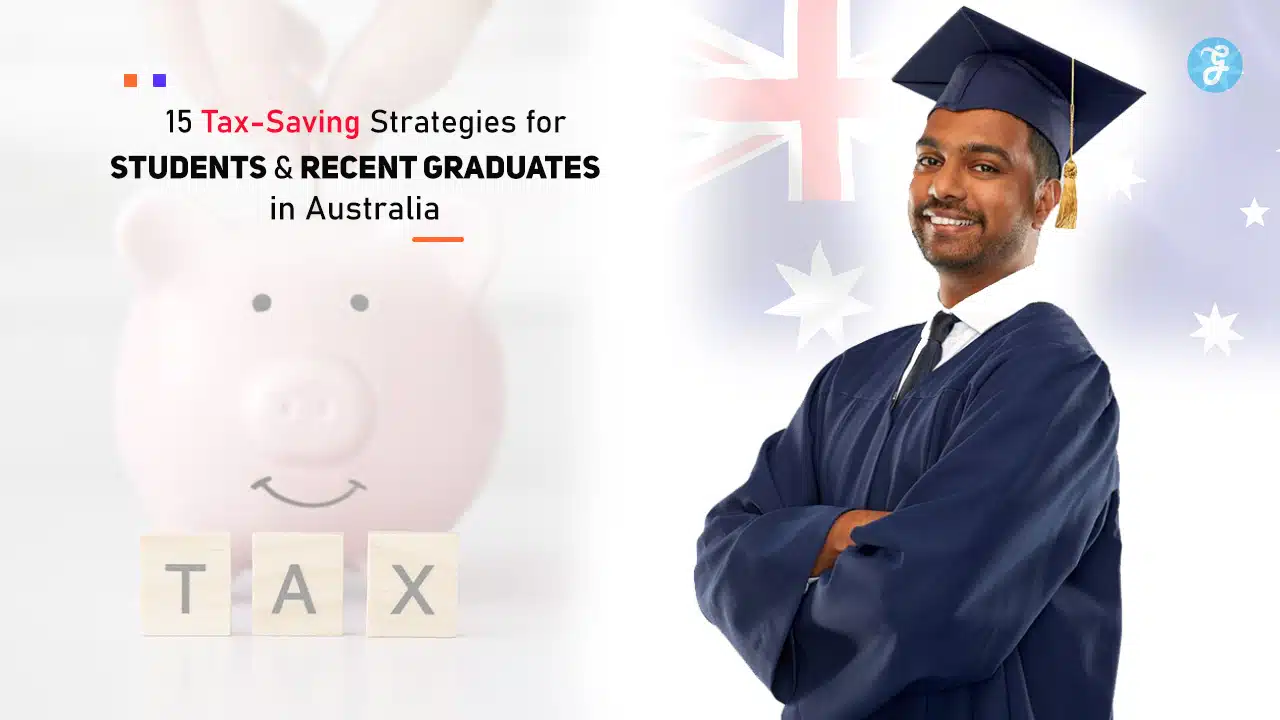As a student or recent graduate in Australia, managing your finances can be challenging. From tuition fees to living expenses, it’s easy to feel overwhelmed.
However, the Australian tax system offers several opportunities to save money through deductions, offsets, and smart financial planning.
By understanding these strategies, you can maximize your tax refund and reduce financial stress as you transition from academic life to your professional career.
This detailed guide explores 15 tax-saving strategies tailored for students and recent graduates in Australia.
1. Claim Self-Education Expenses
Why It’s Beneficial
If your studies are directly related to your current job or enhance your skills for it, you can claim self-education expenses.
What You Can Claim
- Course fees (excluding HECS-HELP repayments).
- Stationery, textbooks, and software.
- Internet and phone bills (proportionate to study use).
- Travel expenses to and from your educational institution.
Pro Tip:
Keep detailed receipts and use apps like ATO’s myDeductions for accurate record-keeping.
2. Leverage the Low-Income Tax Offset (LITO)
What It Is
Students and graduates earning below $45,000 may qualify for the Low-Income Tax Offset (LITO).
How It Works
- LITO reduces the amount of tax you owe.
- For incomes under $37,500, the maximum offset is $700.
- Gradually phases out for incomes between $37,500 and $45,000.
Pro Tip:
Check your income bracket annually to ensure you’re receiving the correct offset.
3. Take Advantage of Work-Related Deductions
Why It Matters
Many expenses incurred while earning an income can be claimed as deductions, reducing your taxable income.
Eligible Deductions
- Uniforms or work-specific clothing.
- Tools and equipment related to your job.
- Travel expenses for work-related trips.
Pro Tip:
Ensure you only claim deductions for items directly related to your job and supported by receipts.
4. Understand Tax-Free Threshold
Why It’s Important
In Australia, you don’t pay tax on the first $18,200 of your income. This is known as the tax-free threshold.
How It Helps
- If you earn below $18,200 annually, you won’t owe any tax.
- For part-time workers or casual earners, this can lead to significant savings.
Pro Tip:
Ensure you claim the tax-free threshold when filling out your Tax File Number Declaration Form with your employer.
5. Claim Internet and Mobile Expenses
Why It’s Beneficial
If you use your internet or phone for work or study purposes, you can claim a portion of these expenses as deductions.
How to Calculate
- Keep a logbook of usage for at least 4 weeks to determine work-related percentages.
- Multiply your total bill by the work-use percentage.
Pro Tip:
Avoid over-claiming; only include study or work-related usage in your calculations.
6. Utilize the HECS-HELP Benefit
What It Is
The HECS-HELP benefit reduces your repayment obligations for specific fields of study, such as teaching, nursing, or mathematics.
Eligibility
- Available for graduates working in eligible fields.
- Reduces the compulsory HECS-HELP repayment amount for a set number of years.
Pro Tip:
Visit the Australian Taxation Office (ATO) website to check if your degree and occupation qualify for the benefit.
7. Claim Moving Expenses for Work
Why It’s Beneficial
If you relocate for a job, certain moving expenses may be tax-deductible.
What You Can Claim
- Transportation costs for you and your belongings.
- Temporary accommodation expenses.
- Storage fees for household items.
Pro Tip:
Relocation must be directly related to starting a new job or business.
8. Maximize Superannuation Contributions
Why It’s Important
Making voluntary contributions to your superannuation fund can reduce your taxable income and prepare you for retirement.
How It Works
- Contributions up to $27,500 annually are taxed at a lower rate (15%).
- Government co-contributions may be available for low-income earners.
Pro Tip:
Check if your employer matches voluntary super contributions to maximize savings.
9. Claim Depreciation on Work-Related Assets
What It Is
If you purchase expensive items for work, such as a laptop, you can claim depreciation as a deduction over its useful life.
How It Works
- Items under $300 can be claimed immediately.
- More expensive assets require annual depreciation calculations.
Pro Tip:
Use ATO guidelines to determine the depreciation rate for your assets.
10. Offset Travel Expenses
Why It’s Beneficial
If you travel for work or education purposes, these expenses may be tax-deductible.
Eligible Travel
- Public transport costs.
- Fuel and parking expenses for work-related trips.
Pro Tip:
Commuting from home to work isn’t deductible; only work-related travel applies.
11. Claim Union or Professional Membership Fees
Why It’s Important
Memberships to unions or professional organizations directly related to your job are tax-deductible.
How It Works
- Include fees in your annual tax return.
- Ensure the membership is essential for your employment.
12. Take Advantage of the Medicare Levy Reduction
What It Is
If your income is below a certain threshold, you may qualify for a reduced Medicare levy or exemption.
Eligibility
- Singles earning below $28,501 may receive a reduction.
- Additional reductions apply for families or dependents.
Pro Tip:
File the necessary forms through your tax return to claim this benefit.
13. Learn About the First Home Super Saver Scheme (FHSSS)
Why It’s Beneficial
The FHSSS allows you to save for your first home using your superannuation fund, offering tax advantages.
How It Works
- Contribute up to $15,000 per year to your super fund for your first home deposit.
- Withdraw these contributions when purchasing your first home.
14. Keep Accurate Records
Why It’s Crucial
Accurate records are essential for maximizing deductions and avoiding ATO audits.
What to Track
- Receipts for expenses.
- Work-related travel logs.
- Study-related expenses like course fees and materials.
Pro Tip:
Use digital tools or apps to organize and store records.
15. Consult a Tax Professional
Why It’s Important
A tax advisor can help you navigate complex tax rules and identify additional deductions.
Benefits
- Avoid costly mistakes.
- Receive personalized advice based on your financial situation.
Pro Tip:
Look for professionals experienced in student or graduate tax matters for tailored support.
Conclusion
Tax-saving opportunities are abundant for students and recent graduates in Australia. By leveraging deductions, offsets, and smart financial strategies, you can maximize your savings and ease the transition into the workforce.
These 15 strategies provide a comprehensive guide to managing your taxes effectively, helping you focus on building your career without unnecessary financial stress.
Start implementing these strategies today to secure a brighter financial future!






































